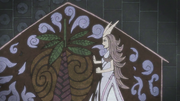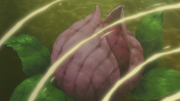No edit summary Tag: sourceedit |
KazeKitsune (talk | contribs) m (→Trivia) Tag: sourceedit |
||
| Line 21: | Line 21: | ||
== Trivia == |
== Trivia == |
||
* {{translation|'Shinju'|神樹}} literally means 'god tree', and its size and nature have connections to both the [[Wikipedia:World tree|world tree]] and the [[Wikipedia:Tree of life|tree of life]], motifs that are present in several real-life religions and mythologies throughout the world. |
* {{translation|'Shinju'|神樹}} literally means 'god tree', and its size and nature have connections to both the [[Wikipedia:World tree|world tree]] and the [[Wikipedia:Tree of life|tree of life]], motifs that are present in several real-life religions and mythologies throughout the world. |
||
| − | ** |
+ | ** The Shinju bearing the fruit that was deemed forbidden to consume is very similar to the story of the [[Wikipedia:Tree of the knowledge of good and evil|Tree of the knowledge of good and evil]] in [[Wikipedia:Abrahamic religions|Abrahamic religions]], in which [[Wikipedia:Adam and Eve|Adam and Eve]], the first humans, ate the forbidden fruit despite being told otherwise. Ultimately, while becoming wiser, it lead to their downfall by incurring the wrath of God. For disobeying Him, He forever cursed the two and their descendants. Adam's eldest son, [[Wikipedia:Cain and Abel|Cain]], would later murder his younger brother, Abel, in anger and jealousy following God's rejection of his offering while accepting Abel's, similar to the struggle between the [[Indra Ōtsutsuki|two]] [[Asura Ōtsutsuki|sons]] of the [[Sage of the Six Paths]]. |
** The wooden dragon-like entities at the base of the Shinju may be a reference to [[Wikipedia:Níðhöggr|Nidhogg]], a dragon or serpent who eternally chews the roots of [[Wikipedia:Yggdrasil|Yggdrasil]] in Norse mythology. Likewise with the appearance of the Shinju, it is said that should Nidhogg finally be free of its entrapment underneath Yggdrasil, its appearance into the world beyond its roots are said to herald the coming of [[Wikipedia:Ragnarök|Ragnarök]], the end of the world and ultimate battle of the gods. |
** The wooden dragon-like entities at the base of the Shinju may be a reference to [[Wikipedia:Níðhöggr|Nidhogg]], a dragon or serpent who eternally chews the roots of [[Wikipedia:Yggdrasil|Yggdrasil]] in Norse mythology. Likewise with the appearance of the Shinju, it is said that should Nidhogg finally be free of its entrapment underneath Yggdrasil, its appearance into the world beyond its roots are said to herald the coming of [[Wikipedia:Ragnarök|Ragnarök]], the end of the world and ultimate battle of the gods. |
||
* When the Ten-Tails was recreated into a tree by [[Obito Uchiha]] in the [[Fourth Shinobi World War]], it was initially referred to as the Shinju by [[Gyūki]],<ref>Chapter 646, page 5</ref> but it was later confirmed to be a form of the Ten-Tails.<ref>Chapter 673, page 6</ref> Likewise, the Ten-Tails' tree form was referred to as the Shinju as well in the fourth databook, but it also showed the recreated tree to be another form of the Ten-Tails.<ref>Fourth Databook, page 107</ref> |
* When the Ten-Tails was recreated into a tree by [[Obito Uchiha]] in the [[Fourth Shinobi World War]], it was initially referred to as the Shinju by [[Gyūki]],<ref>Chapter 646, page 5</ref> but it was later confirmed to be a form of the Ten-Tails.<ref>Chapter 673, page 6</ref> Likewise, the Ten-Tails' tree form was referred to as the Shinju as well in the fourth databook, but it also showed the recreated tree to be another form of the Ten-Tails.<ref>Fourth Databook, page 107</ref> |
||
Revision as of 13:38, 19 September 2015
| This article is about the tree. For chapter 646, see Shinju. For other uses, see Shinju (disambiguation). |
The Shinju (神樹, English TV: Divine Tree) was an ancient tree which grew from the blood of the deceased during the era of endless wars at the dawn of the human race, and was worshiped as the host of a god. Every millennium, the tree would grow a mysterious fruit, which humans were specifically instructed to never lay so much as a single finger on. Consumption of the Shinju's fruit bestows an ability upon its consumer's body to produce powerful chakra.[1][2] In Boruto: Naruto the Movie, it is revealed that many trees have existed throughout various realms and ages, the Earth's Shinju being only one of them. Another such tree also existed where Momoshiki and Kinshiki hail from.[3]
Background

Kaguya depicted with the fruit.
A millennia ago, mankind fought countless battles, leaving the earth soaked in blood. This tree would grow from the blood of the deceased, getting attention of the Ōtsutsuki clan, as it bore a fruit of great power. Kaguya Ōtsutsuki, a princess and leader of the clan, longed for peace. Having decided that it was necessary for her to attain god-like powers in order to put an end to all of humanity's conflicts, Kaguya defied the taboo of consuming the fruit of the Shinju. Using her new-found power, Kaguya single-handedly ended the wars, and for her deed, she was worshiped as the Rabbit Goddess.
However, Kaguya had grown despotic, power having clouded her judgment, resorting to control mankind by force, something which would change her public image of a benevolent goddess into that of a demon.[4][5] On the brink of insanity, Kaguya combined with the Shinju itself to create the infamous Ten-Tails when she discovered much to her anger that her two sons, Hagoromo and Hamura, inherited her powerful chakra and unique dōjutsu.[6]
Personality
The Shinju was an impartial entity, completely devoid of feelings and ideals as it stayed neutral and almost ambivalent to the constant wars that were waged around it by mankind.[2]
Abilities
Once the Infinite Tsukuyomi is cast, the user can assimilate victims of the genjutsu into the Shinju by binding them with its roots.[5] Upon doing so, the Shinju's life force will sustain the victims' lives indefinitely, while also gradually transforming them into White Zetsu.[7]
Chakra Fruit
 The fruit bore by the Shinju. |
Once in a millennium, the Shinju bore a single fruit, consumption of which was deemed forbidden. Upon breaking the taboo and consuming the Chakra Fruit (チャクラの実, Chakura no Mi), Kaguya Ōtsutsuki gained an enormous amount of exceptionally powerful chakra, with which she was able to single-handedly end all the wars that plagued the lands,[2] and obtained even greater power than the Sage of the Six Paths himself.[4] By utilising the Infinite Tsukuyomi and God: Nativity of a World of Trees, it is possible to gather all the chakra in the world into a single being once more, thus allowing the Shinju to grow a new fruit in place of the one Kaguya consumed.[5]
Trivia
- 'Shinju' (神樹) literally means 'god tree', and its size and nature have connections to both the world tree and the tree of life, motifs that are present in several real-life religions and mythologies throughout the world.
- The Shinju bearing the fruit that was deemed forbidden to consume is very similar to the story of the Tree of the knowledge of good and evil in Abrahamic religions, in which Adam and Eve, the first humans, ate the forbidden fruit despite being told otherwise. Ultimately, while becoming wiser, it lead to their downfall by incurring the wrath of God. For disobeying Him, He forever cursed the two and their descendants. Adam's eldest son, Cain, would later murder his younger brother, Abel, in anger and jealousy following God's rejection of his offering while accepting Abel's, similar to the struggle between the two sons of the Sage of the Six Paths.
- The wooden dragon-like entities at the base of the Shinju may be a reference to Nidhogg, a dragon or serpent who eternally chews the roots of Yggdrasil in Norse mythology. Likewise with the appearance of the Shinju, it is said that should Nidhogg finally be free of its entrapment underneath Yggdrasil, its appearance into the world beyond its roots are said to herald the coming of Ragnarök, the end of the world and ultimate battle of the gods.
- When the Ten-Tails was recreated into a tree by Obito Uchiha in the Fourth Shinobi World War, it was initially referred to as the Shinju by Gyūki,[8] but it was later confirmed to be a form of the Ten-Tails.[9] Likewise, the Ten-Tails' tree form was referred to as the Shinju as well in the fourth databook, but it also showed the recreated tree to be another form of the Ten-Tails.[10]
- When Kaguya was defeated by Naruto and Sasuke, the Shinju, being one with her, was sealed by the Six Paths — Chibaku Tensei in Kaguya's core dimension.[11]
